|
|
| Khukuri
|
| |
|
Khukuri is the national knife of Nepal and also symbolic of the Gurkha
soldier, a prized possession with which he has indelibly carved an
identity for himself. The awesome cutting edge of the Khukuris was
first experienced by the British in India who had to face it in the
well-documented battles since 1814 while combating the Gorkha army
in western Nepal. Thus was born the legend and the romance. In the
Gurkha soldier's grip, this seemingly small piece of curved steel
becomes an incredibly menacing weapon with which he has demonstrated
rare feats of bravery while facing the enemy in many a battlefield. |
|
Khukuri is a medium-length curved knife each Gurkha soldier carries
with him in uniform and in battle. In his grip, it is a formidable
razor-sharp weapon and a cutting tool. In fact, it is an extension
of his arm. When his rifle misfires, or when his bullets have run
out, a Gurkha unsheathes his Khukuri and makes his final "do-or-die"
run on the enemy in a fury to finish the business. This scene created
the romance and the legends. What it really did, and still does, is
a super-clean slaughter: The enemy tumbles down in two clean pieces-
and in surprise!-because his is the kindest, quietest death because
it is the quickest. |
| |
|
Making Process: |
|
The raw materials -steel, brass, rosewood, buffalo hide and
horn - are first carefully selected.Cutting the steel from truck springs,
forging the steel to exact specifications. |
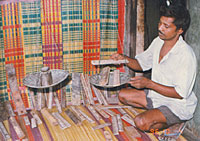 |
| 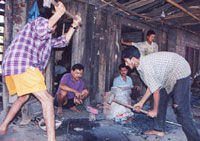
|
Notice that the Kami is pouring cold water only on the blade
edge - the backbone of the blade is still red hot. When
finished, the cutting edge will be harder than the backbone,
which will remain softer. This technique, called zone-hardening,
will keep the khukuri flexible so that the blade can absorb
the shock of impact and not break, while the cutting edge
will remain hard and hold its edge. |
|
|
Reliable
knives should have a full tang (a tang that goes all the way
through the handle). This photo shows a kami forging
the full spike tang that most of our khukuris are made with
(except the Panawal, which has a full exposed tang
with scale handles fastened to it.
Some
of our models come with brass inlay work on the and engraving
pattern along the backbone of the blade. Here, a Kami
is performing the inlay work with his hands and feet!
|
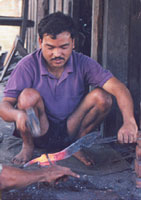 |
|
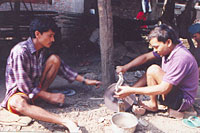 |
Here
they are sharpening the blade. |
|
| Many
of our Khukuris are crafted with waterbuffalo horn. Here
is a bag of raw pieces of horn that will eventually become handles.
Note that the size of the horns limits the handle size - so
models like the Dragon can't be made with waterbuffalo horn.
|
 |
|
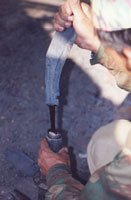 |
A
final preparation.
A
Khukuri is ready to use.
|
|
| |
| Delivery
Terms: |
| 1.
Time of delivery depends on the designs and quantity you order. |
| 2.Since
the statues are exclusively hamdmade item, there would be slide variation
in its sizes and weight. |
| |
| Mode
of payment: |
| Please
click on "Mode of payment"
for more details. |
| |
| Mode
of shipment: |
| Please
click on "Mode of shipment"
for more details. |
| |

